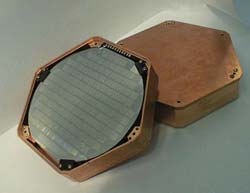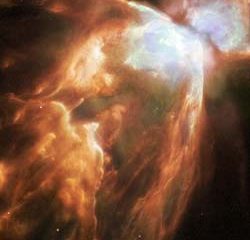This area deals with the fundamental laws and building blocks of nature and how they interact, the properties and the behavior of matter, and research into space and time and their structures.
innovations-report provides in-depth reports and articles on subjects such as astrophysics, laser technologies, nuclear, quantum, particle and solid-state physics, nanotechnologies, planetary research and findings (Mars, Venus) and developments related to the Hubble Telescope.

Trailblazing VLT Interferometer Studies of the Central Region in Active Galaxy NGC 1068
Fulfilling an old dream of astronomers, observations with the Very Large Telescope Interferometer (VLTI) at the ESO Paranal Observatory (Chile) have now made it possible to obtain a clear picture of the immediate surroundings of the black hole at the centre of an active galaxy. The new results concern the spiral galaxy NGC 1068, located at a distance of about 50 million light-years.
They

Since November, a physics experiment called the Cryogenic Dark Matter Search (CDMS II) has been looking for components of dark matter, the primary “stuff” of which the universe is made. Conducted from the Soudan Underground Mine in northern Minnesota, the search is for postulated dark matter particles called WIMPS–weakly interacting massive particles. So far, the experiment has found no WIMPs, but neither has it found contamination from stray neutrons. CDMS II member Priscilla Cushman, a physics pro

CDMS II presents new results on Weakly Interacting Massive Particles that could make up most of the matter of our universe
With the first data from their underground observatory in Northern Minnesota, scientists of the Cryogenic Dark Matter Search have peered with greater sensitivity than ever before into the suspected realm of the WIMPS. The sighting of Weakly Interacting Massive Particles could solve the double mystery of dark matter on the cosmic scale and of supersymmetry on the

Rice-Los Alamos team find remarkable similarity between data from sky and computer
In the early years of the Space Age, astronomers made the startling discovery that short, transient flashes of gamma rays occurred randomly in the sky every night. Only within the past decade have scientists uncovered evidence to associate gamma-ray bursts with the death cries of massive stars from the edge of the universe. But they’ve had very few clues about how a “hypernova” or “collapsar” might

In some hours, at midnight between Friday and Saturday, ten more countries will join the European Union. The EC-supported Venus Transit 2004 (VT-2004) programme is active in almost all of these, with VT-2004 National Nodes already established the Czech Republic, Hungary, Malta, Poland, Slovenia and Slovakia; more are likely to follow soon. The organisers include the Astronomical Institute of the Academy of Sciences of the Czech Republic and the next VT-2004 meeting will be held near Prague on May 7-

The Bug Nebula, NGC 6302, is one of the brightest and most extreme planetary nebulae known. At its centre lies a superhot dying star smothered in a blanket of ‘hailstones’. A new Hubble image reveals fresh detail in the wings of this ‘cosmic butterfly’.
This image of the Bug Nebula, taken with the NASA/ESA Hubble Space Telescope (HST), shows impressive walls of compressed gas. A torus (‘doughnut’) shaped mass of dust surrounds the inner nebula (seen at the upper right).
At the h